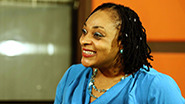Journey to becoming a Chartered Educational Assessor
 Helen Obiageli Oshikoya has embarked on the journey to become a Chartered Educational Assessor. After completing an online session and face to face training, Helen reflects on her experience so far.
Helen Obiageli Oshikoya has embarked on the journey to become a Chartered Educational Assessor. After completing an online session and face to face training, Helen reflects on her experience so far.
My current role involves carrying out assessments for identifying children with Neurodevelopmental disorders both in schools and in the hospitals. This process is done by screening children using early childhood screening tools as prescribed by the Nigeria Federal School Health Policy 2006. All the assessment tools are obtained from Pearson Clinical UK and I carefully select the assessment tool taking into consideration the differences in language and culture. The screening process begins after obtaining the permission and consent of the parents.
The role of a Chartered Educational Assessor is not common in Nigeria and it would appear that we may not have any such role in Nigeria at the moment. I however stand corrected. The assessment processes in schools are regulated by the individual school and not so much at the national level.
The Federal Ministry of Education gives assessment guidelines to schools, universities and colleges and they are free to develop their own assessment process as they deem fit. Different regions within the country have different processes that are created to suit each region as the country is quite diversified.
The assessment process in the Christian regions are different from those in the Islamic regions. This is due to the differences in cultures, tribes and ethnic minorities. My training as a CEA will give me the qualification I need to assist me in making the process uniform so that there will be transparency within the present system we have.
“I totally enjoyed the online section of the course”
I was very nervous about taking the CEA course, however, I totally enjoyed the online section of the course as it prepared me for the face to face session, which really exceeded my expectations as the material was well delivered and I went away knowing that I had made a good choice.
The area that was very interesting for me was in the area of communication. I was able to discover different methods of communicating with others and that is very important especially when I have to deal with people that are not so enlightened or who are fixed in their ways of doing things.
“I found the face to face sessions so useful and engaging”
The face to face sessions were so useful and engaging. I was able to meet some very interesting people and I was able to tap into their wealth of knowledge as most of them clearly had more experience and knowledge than I in the process of administering an educational system.
The training enabled me to see where I could improve and also enabled me to really understand my role as an assessor. I was able to see where we are going wrong in Nigeria. The training also helped me to come up with a map for improvement which is key. With the added knowledge that I recently gained, I believe I am in a better position to supervise more efficiently and also provide and share more knowledge to educators.
We will be following Helen as she progresses through the next stage of the training - the completion of an assignment which involves quality assuring the assessment processes that take place in a school, college, department or place of work. Helen will act both as a facilitator of change within the institution, as well as challenging and validating the change process. She will then complete a portfolio outlining her activities.

